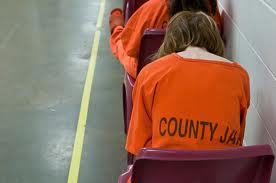In Prison with Schizophrenia
Last year I visited a man at the Colorado State Penitentiary, a Level V security correctional institution for adult males who are the most violent, dangerous, and disruptive offenders. His family, who lives in Kentucky, contacted me through my work at the National Alliance on Mental Illness (NAMI) and asked me to go. His mother, whom he usually called every week, had not heard from him in months and she was frantic.
David has schizophrenia, and during a psychotic episode he jumped on a bus headed for who knows where. When the bus stopped at a truck stop, he went inside, picked up a Buddha from the gift shop, and walked out the door. Buddhism was an important part of David’s life, even more so when he was delusional. Unfortunately, that Buddha was valued at over $1000—a felony. He was sentenced to a year that expanded to four because of his behavior in prison. Untreated and psychotic, he was in and out of solitary confinement, once for throwing a cafeteria tray at a guard. David’s family had been trying to get him transferred from the prison to the state hospital for over a year. They had no idea what his physical or mental state was but feared the worst.
After a month, I succeed in getting on his visitor’s list and headed to the penitentiary to see him. I was sitting in a booth separated by Plexiglas when a guard brought him in. He wore an orange jumpsuit, handcuffed, feet chained, his eyes wild and afraid. His anxiety kept him from sitting. Again and again from the other side of the glass, I reassured him that I was a friend; I was there for his mom; she was worried because he hadn’t called. He was so silent I wondered if he could speak at all. Trust came slowly but soon he settled into the chair and began to babble, too fast for me to keep up. He was disoriented, scared, and clearly psychotic, but he understood one thing—he wanted out. He pleaded with me to get him into the hospital even as I was walking out the door, my visiting time expired.
There was so little I could do. I hadn’t even been allowed to bring him snacks or cards from his family. The injustice was so apparent, the real crime not David’s, but the judicial and mental health care system that fails some of our most vulnerable. Instead of treatment, David was being punished. It’s such a common occurrence that those with mental illness comprise 25-30 percent of our prison population. In fact our county sheriff calls his jail the local mental health institution. Not only is the system unjust, it’s also costly, socially and economically. If David were in treatment, we, as taxpayers, would not be footing the expense of his incarceration, and David would have the chance to recover.
The good news is that two weeks after my visit, David was finally transferred to the forensic unit at the state hospital, which is reputed to be one of the better psychiatric hospitals in the state. The last time I spoke with the family, they reported that David had stabilized, was calling his mother again, and his fear was gone. I’d like to think it was because of my visit and my connection to NAMI. But whatever the reason, David was where he needed to be.



